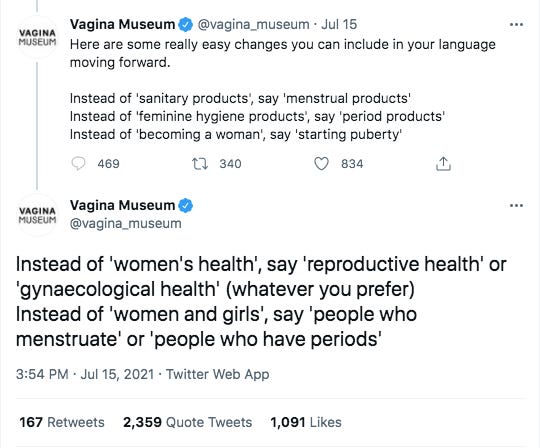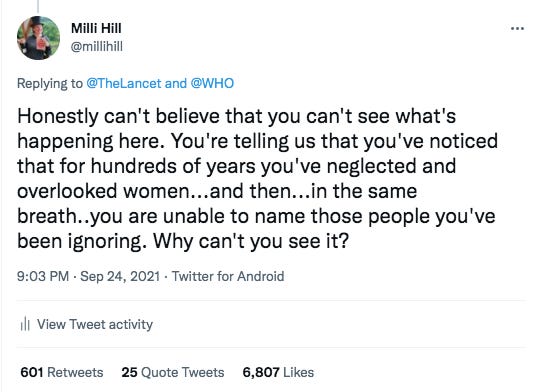Woman: the sex that dare not speak its name.
Everyone is shocked by two very public erasures of women in the past couple of days.
In the first, the American Civil Liberties Union (ACLU) wanted to celebrate the anniversary of Ruth Bader Ginsburg’s death by sharing a quote from her about abortion rights.
Except the quote was ‘adjusted’.
And here’s what RBG actually said.
The word ‘woman’ is replaced by ‘person’. ‘Her’ by ‘their’.
And the sentence ‘It is a decision she must make for herself’, is missing.
And just when poor RBG was only 180 degrees through a 360 spin in her grave, the Lancet proudly and without a hint of irony tweeted the front cover of their latest edition.
Yes, this is the Lancet, one of the oldest and most prestigious medical journals in the world, apparently unable to see the disconnect between on the one hand publicly admitting that science has for hundreds of years largely been disinterested in the workings of the female body, whilst on the other hand appearing to think it’s ‘progressive’ and ‘inclusive’ not to even name those people they’ve so effectively sidelined and ignored.
To make matters worse, the cover quote is pulled from an article inside reviewing an exhibition by London’s Vagina Museum on the history of periods with a particular emphasis on the stigma and shame surrounding menstruation. Again, the fact that much of this shame and stigma has consistently manifested through the censorship of words, and our collective historic inability to talk about or name women’s experiences or body parts, is an irony that escapes both author and editors.
It’s also an irony that escapes the Vagina Museum itself. Like many feminists interested in breaking down the barriers to discussing women’s lives and experiences, I was thrilled to see the launch of the Vagina Museum in 2019. I even thought about having the launch of my second book Give Birth like a Feminist, there, and although in the end we had it elsewhere, the Vagina Museum stocked my book in their shop and I had some good chats with their founder about all things vulvic over twitter.
But not any more. My book is no longer on their website, and I’m now blocked by the museum and its founder. My crime? Daring to politely question a series of tweets in which they instructed people to stop using the word ‘woman’ and other sexed words in relation to periods, because, ‘anyone can menstruate regardless of their gender’.
What we are looking at here is ‘ideological capture’. Gender ideology gives us one key message - how you feel on the inside is more relevant than your body, genitals or DNA: gender trumps sex. Once you’ve absorbed this, it becomes second nature to say with confidence that ‘not just women menstruate’ - because if gender trumps sex and a woman is just a 'gender’, an ‘identity’ - then of course this is absolutely true. Without even blinking you can then add that the government is wrong to control reproductive choices for [people] because the decision of whether or not to bear children is central to a [persons] life, and even find yourself thinking that poor old RBG’s archaic language use was, frankly, ripe for a bit of an update.
But the penny is slowly dropping. Over in the ‘birth world’, there was initially a fair amount of outrage over the Lancet’s ‘bodies with vaginas’, because let’s face it, it’s hard to look at it as a woman and think, yeah, being described in the manner of a cadaver on a necrophiliacs wish list is just flipping BRILLIANT.
But believe it or not, there’s some backtracking being done now, as those whose first reaction was #nothankyou, suddenly realise that this is putting them in the firing line for an accusation of transphobia. Because the birth world, like the Vagina Museum, ACLU, the Lancet and so many others, is also largely captured by gender ideology. Amazingly, some midwives and doulas are defending the Lancet cover as ‘inclusive language’, because, yup you guessed it, saying that medical science doesn’t give a fig about women ignores the fact that it’s actually bodies with vaginas that they couldn’t care less about. Bodies with vaginas is more inclusive.
Others are retreating to sit on the fence saying that the Lancet is ‘just an extreme example’ and not able to make the connection between the fact that they’ve embraced the term ‘women and birthing people’ and are using it everywhere, and the fact that the evidence of woman erasure is getting harder and harder to ignore. So here is my explanation of the connection for those who still can’t see it, or who are perhaps thinking that the pink skin of the emperor is just a trick of the light and that he is actually wearing clothes after all:
If you say ‘women and birthing people’ you are performing a linguistic trick. You are saying there are two kinds of people who give birth. Women. And birthing people. The trick that this performs is it changes the meaning of the word ‘woman’ from a sex, to a gender. This is gender ideology in action, and you have been captured by it.
The established meaning of ‘woman’ is an adult human female. This is inclusive. It includes everybody with a female body and therefore everybody capable of having a baby. If you add a second type of person you are undermining the meaning of the first category. You are changing the meaning of ‘woman’ from a biological sex, to an identity. Goal achieved: gender trumps sex.
This is not about birth, or trans people even, it’s about linguistics, and about how changing the long established meanings of words can and will have an impact on our rights. If woman is not the word for an adult female person any more, if it becomes a ‘gender’ not a ‘sex’, then this has ramifications for women’s rights. These ramifications are already being felt - as women only spaces, shortlists, panels, sports, refuges, prison and more are no longer only for biological women. Research and data collection will also be transformed if gender identity is given precedence over sex - for more on this listen to this podcast with Professor Alice Sullivan on why we need accurate data on sex in science.
To give you a concrete example from my own life, I was recently asked to fill in a survey from a leading publisher which had the specific aim of gathering data on their authors and assessing how inclusive they were being as a publisher. I was asked to give information about everything from my heritage to what my parents did for a living. Apart from one thing. I was not asked my sex. Instead I was asked, ‘How would you describe your gender?’. How will this publisher measure their inclusivity of women writers, or any bias towards male authors, if they don’t ask for this information on a survey set up to assess their own representation and diversity? And who might suffer from this lack of data, do you suppose?
I’ve been called ‘evil’ ‘TERF’ ‘bigot’ ‘piece of shit’ ‘harmful’ ‘toxic’ and ‘dangerous’ for raising these issues. I’ve been deplatformed from a major conference and ostracised by many in the birth world - but I won’t stop raising them. As much as I’ve hated seeing the words changed in a quote from one of the most impressive women of the last century, and a front cover article about periods referring to ‘bodies with vaginas’, in the past two days I have felt a shift as more people begin to wake up to what is happening. My tweet on the issue has gone viral.
And I’ve felt somewhat vindicated. Women are not holes. We are not a set of orifices. We contain multitudes. We are strong, vibrant, powerful and great. Our sex is what gives us our power and it is also the basis on which we are oppressed. For me, the right side of history is one which acknowledges all this. And the wrong side is one which takes away our words and attempts to ignore, sideline, disempower and dehumanise us. Same as it ever was.
Thanks for reading. Want to support me? I have 3 books which you can buy from any good book seller!
My Period is for girls age 9 to 13 and is filled with information and positivity about periods and puberty.
Give Birth like a Feminist is for anyone interested in why birth is a feminist issue. You don’t have to be pregnant.
The Positive Birth Book is a comprehensive guide to getting ready for birth with lots of humour and a dash of feminism thrown in.
Links to a few ways to purchase via my linktree - or just search the title name via your usual book shop.
Or you can buy me a coffee. :-)












